
Will the EU collapse in the future?
Share
At the very least, the EU's high-welfare social model, which rests on stable US-Russia relations, will surely collapse.
The European Union is supposed to have one of the best welfare economies in the world. According to the OECD, most of its members work less than six hours a day, with Germany putting in just 5.2 hours a day and France 5.8. In contrast, East Asian countries have a strong overtime culture, with South Korea working 7.8 hours a day and China 9.2 hours. A trip to the EU reveals that many workers leave early after 4pm, and some are even starting to enjoy a four-day workweek. European Union law also requires member states to grant employees at least four weeks of paid leave, so every summer and winter European tourists flock to take long vacations around the world.
But strangely, although the European Union working time is very short, and a long vacation, but the eu's per capita income and welfare level was significantly higher than the hard-working people of east Asia, the European Union nearly $40000 per capita GDP, the Western Europe more than $50000, the standard of living is higher than that in east Asia, Japan and South Korea area. Part of the reason is that the EU has strong basic. As the birthplace of the first and second industrial revolutions, the EU still retains a dominant position in many high-tech fields and can earn profits from the rest of the world by adding value to technology.
But the bigger reason is that the EU has enjoyed too much of a diplomatic dividend over the past 30 years.
Jack of both sides between China, the US and Russia has provided the EU with huge economic benefits:
When the Soviet Union collapsed in 1991, the European Community lost a formidable enemy, its moribund successor, Russia, completely incapable of waging a major war. China accelerated reform and opening up and undertook a large number of labor-intensive industries. At this time, the United States was at the peak of its national power, but for ideological and historical reasons, the United States still aimed its strategic target at China and Russia. The Europeans suddenly found themselves with an opportunity to sit on the fence between the United States and China and Russia, exploiting the contradictions between the United States and China for economic gain.
Russia is rich of energy, so from the 1990s, Western Europe, especially Germany, began to vigorously promote the energy cooperation between Europe and Russia. When German Chancellor Schroeder took office in 1998, he regarded Russia as the most important partner for Germany's lack of natural gas resources. He visited Russia many times at the risk of offending Britain and the United States, and laid the cornerstone of energy cooperation between Germany and Russia. Schroder led THE construction OF THE FAMOUS Nord Stream 1 PIPELINE, which carries 55 billion cubic meters of gas a year, enough to meet half of Germany's gas needs. To keep the project on track, Mr. Schroeder worked as a Russian energy executive after he stepped down as chancellor, maintaining Germany's energy lifeline.
Thanks to Russia's energy pipelines, the EU gets extremely low energy prices, which are only half of those in East Asia when sea freight is taken into account. This is the key to why the EU can maintain manufacturing competitiveness despite high labor costs. Energy cooperation between Europe and Russia not only allows Russia to earn rich oil and gas income, but also allows the EU to significantly reduce the production cost of industrial products.
Eastern Europe is undefensible, and a strong Russia is a constant threat to the EU: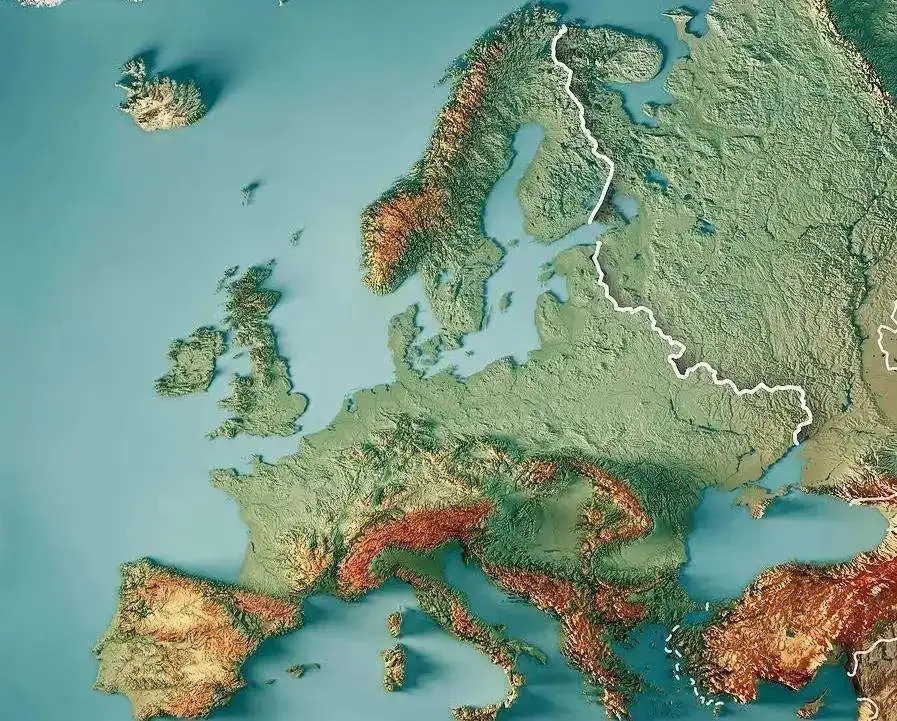
There is no free lunch in the world. For the EU, although Russia can provide it with cheap energy, a strong Russia will also pose a geopolitical threat to the EU. Eastern Europe was flat and almost insurmountable, and historically Europe was often threatened by enemies from the east (including the Huns, Mongols, Soviet Russians, etc.). Therefore, no matter how much Russia wants to integrate with the West, it will be shut out, because the West Europeans know that, by virtue of geopolitical repression, if Russia succeeds in rising, the whole of Western Europe will be no beaten, and cooperating with the Russians will be like walkting with a tiger.
In ancient times, Europeans would have tried to build great walls or rely on rivers (mainly the Danube) to fend off threats from the east. But in modern times, Europeans have found a new way to turn to the United States and rely on its military protection against the Russian threat.
The existence of NATO allows the EU to save a lot of military spending:
European countries spend on military as a share of GDP: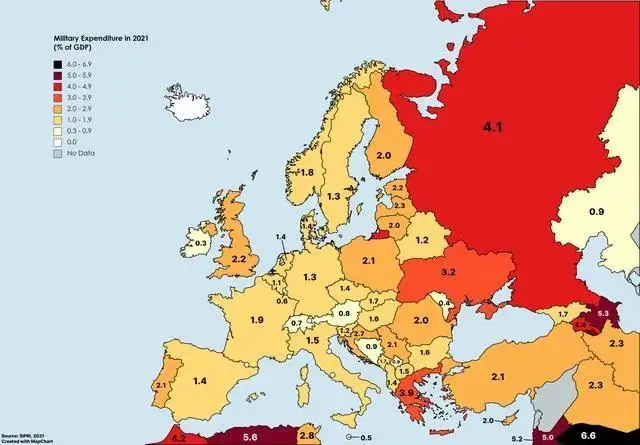
With the mechanism of NATO, the United States not only provides a nuclear umbrella for the European Union, but also has deployed a large number of troops in the European Union, relying on the principle of collective defense to deter Russia. In this context, after the Cold War, all EU countries sharply reduced their military spending, with most countries spending less than 2% of GDP, much lower than the US and Russia. The European Union has saved a lot of money to pay for the welfare of its citizens. Not only that, the expensive American military stationed in Europe can also boost the surrounding jobs every year, killing two birds with one stone.
So over the past three decades, thanks to cheap energy from Russia, cheap defense from the United States and cheap goods from China, the EU has not only maintained its economic prosperity, but also largely met its defense and security needs. The EU's foreign policy has also been trying to maintain a delicate balance between China, the US and Russia. Anti-pacifism and universal values have a strong market within the EU, because the more peaceful the world is and the more the moral high ground plays a role, the more the EU can enjoy such huge economic benefits.
With cheap energy hedge welfare society under the high labor costs, with the United States military protection hedge Russian security threat, with cheap commodity hedge easing inflation pressure, economic policy on the layers buckle designed ably, the European Union to realized the multiple equilibria in economy and diplomacy, makes it the quality of life of the highest in the world. Work intensity is much lower than in East Asia, but per capita income is as high as in the United States, making it the happiest place in the world and the most attractive place for immigrants.
The euro exchange rate depends on European and American monetary policy on the surface, and on international situation in essence:
But the EU's economic model relies heavily on the diplomatic environment, and too bad or too good a relationship with China can lead to its collapse. Until 2018, the United States and China and Russia will continue to fight but not break the pattern, and the European Union will be able to find its way between the two camps. After 2018, with the outbreak of the trade war between China and the United States, which has turned the world's two most powerful countries into full opposition, the EU's economic model of playing both sides of the divide has become increasingly difficult to sustain. The Russia-Ukraine war in 2022 officially declared the failure of the EU's fence policy, and it will be forced to choose between economic interests and security needs. In the long run, the EU economy will sink into recession, and the old left-wing calls for globalisation, environmental protection and equality will no longer bring benefits. A rightward shift is inevitable.
In fact, the European Union is not a unified country, as a political entity with incomplete internal, the European Union is born with two major problems. One is the fiscal and monetary disunity that has brought southern and northern countries into conflict. The other problem is that energy interests and defense needs are not unified, which brings about conflicts between western and Eastern European countries.
Southern European countries have high debt ratios (total debt as a share of GDP) :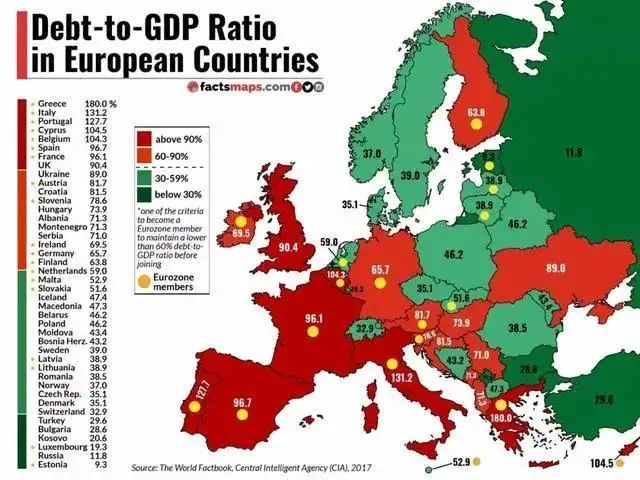
As a union, the European Union has a common central bank and a common currency, but no common fiscal policy. Since the creation of the euro, Germany and other northern European countries have driven the industries of southern European countries (especially Greece, Italy and Spain) to the ground by virtue of their strong manufacturing competitiveness. With a single currency, countries such as Greece could not rely on devaluations to maintain industrial competitiveness, but saw their industries wiped out. Not only did they lose a lot of jobs, but they also lost an important source of tax revenue, and they had to borrow to survive. This is also an important reason for the outbreak of the European debt crisis in 2010.
The problem for the EU is that the biggest beneficiaries, manufacturing powerhouses such as Germany and the Netherlands, refuse to make fiscal transfers to southern Europe. The Germans take credit for the economic miracle after the creation of the euro and blame the regional divide on the laziness of southern Europeans, even though Germans work fewer hours than their southern counterparts. This caused the first split within the EU in 2010, when Greece, Italy and others came close to leaving the euro. Only in the end did Germany reluctantly lead the push for hundreds of billions of euros in fiscal relief, but only on condition that the Greeks implement an austerity package. The European debt crisis is a tentative solution.
Nord Stream means that Germany can enjoy economic benefits from Russia without military obligations: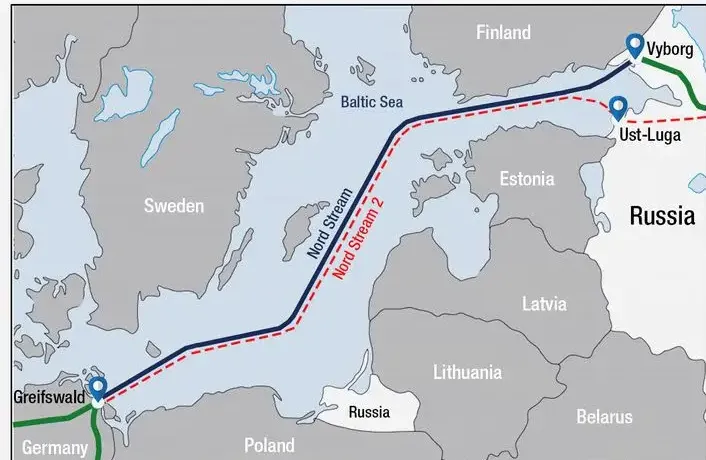
Fiscal and monetary disunity may be easy to resolve, but energy interests and defence needs are hard to resolve. Eastern European countries (especially Poland, Lithuania, Latvia, Estonia, etc.) are on the front lines of the war against Russia. They have deep historical animosity with Russia and constant fear of being annexed by Russia, so they must be anti-Russian from a practical interest point of view. He not only advocated being tough on Russia, but also hoped that core countries such as Germany and France could provide certain military support to it. Especially after the Crimea crisis in 2014, Eastern European countries are generally worried that they will become the next Ukraine in the face of Russia's expansion momentum, so they hope that Germany and France can come forward and lead the EU to curb Russia's military expansion.
But that hope was ultimately thwarted, and Germany and France, lured by cheap energy, opted for appeasement. In early 2015, Germany and France forced Ukraine to negotiate with Russia on the grounds that its gas needs were not being met, and signed the Minsk Agreement, which not only required Ukraine to acquiescence to the ceding of Crimea, but also required Ukraine to recognize the autonomy of the Donbass region. The deal was seen by Ukrainians as humiliating and left eastern Europeans with little confidence in German and French security commitments. It is widely believed that Germany and France will still sell out Eastern European interests for Russian energy if they are invaded by Russia one day. From 2015, Eastern European countries accelerated the process of turning to the United States. Especially after Biden took office, the foreign policies of most Eastern European countries almost followed the British and American countries rather than Germany and France, which became a major obstacle to the EU-Russia peace talks.
Before the war, Germany offered only 5,000 helmets to Ukraine, making it the least helpful Western power: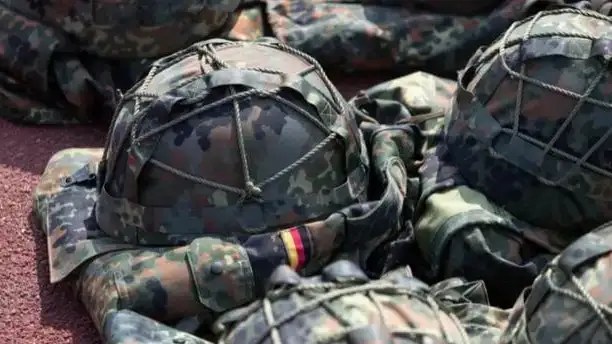
Since the outbreak of the war, Germany has been the most passive European country in assisting Ukraine. Before the war Germany only promised to provide 5000 helmets to Ukraine. However, these 5000 helmets were not delivered to the Ukrainian army. After March, even as Western countries stepped up aid to Ukraine, Germany paid more lip service than it did, and arms deliveries were delayed. Germany's stance is not only distasteful in Ukraine, but also in eastern Europe, which has a history of falling victim to appeasement. Britain and America, by contrast, have gone to great lengths to help Ukraine (though more for the sake of fire). Eastern European countries are voting with their feet, not only to become more diplomatically bound to the United States and Britain, but also to favor the United States and Britain in terms of arms orders, because they fear that one day after a war with Russia, Germany and France will restrict the export of ammunition, so that even the number of German/legal weapons will become a mere display. A deep rift has opened up within the European Union, with financial tensions between southern and northern Europe being followed by security tensions between eastern and Western Europe.
After the Russia-Ukraine war, Germany was pushed to the forefront. As the most developed country in the European Union, Germany enjoyed the most benefits, but failed to fulfill corresponding obligations.
Germany is one of the biggest beneficiaries of the post-Cold War international order:
After the Cold War, the development of Germany and Japan showed completely different trends. Japan has fallen into the "lost three decades", with a serious aging population, low growth, low interest rates and high debt becoming the labels of the Japanese economy. The whole society seems to have lost its vitality, the entrepreneurial culture has been suppressed, and a large number of young people are lying flat. By contrast, Germany's economy, which also faces an ageing problem, is booming and on track to overtake Japan in GDP. Why is that? For Germany has the diplomatic and economic dividends that the EU offers.
During the Cold War, Germany was on the front lines against the Soviet Union:
By having a buffer state, Germany is free to engage in energy co-operation with Russia and take advantage of cheap Russian oil and gas. Japan also wants to import oil and gas from Russia, but on the one hand, because of the territorial dispute between Japan and Russia, the economic and trade cooperation between the two countries is limited; On the other hand, Japan has to compete with China in the Far East oil and gas pipeline (such as the divergence between the "Ananda line" and the "Anna line"), and in Russia's Far East oil and gas pipeline, Japan and China will eventually share half of the transport volume. With energy prices higher than Germany's, the Japanese have to work a lot of overtime to stay competitive.
Moreover, Sino-Japanese relations are far less close than Sino-German relations due to the existence of Sino-Japanese conflicts. Even though Japan is closer to China and shipping costs are lower, Japanese cars simply don't sell as well in China as German cars. China has also become Germany's largest market. Every year, Germany exports a large number of high value-added products such as machinery and equipment, automobiles and precision instruments to China.
On the other hand, the accession of Eastern European countries to the European Union has provided Germany with a steady stream of young workers. Located in the middle of Europe, Germany is the crossroads of Europe, and young people from Eastern Europe often choose it as their first choice for migrant work. Because OF Germany ECONOMY STRENGTH IS ABUNDANT NOT ONLY, ALSO BE BECAUSE Germany IS DEVELOPED COUNTRY INSIDE LEAVE EASTERN Europe RECENTLY, GO TO Germany TO WORK FAR MORE CONVENIENT THAN GO TO England, France TO WORK. Therefore, Germany has also become the biggest winner of the EU's eastward expansion. Among the more than 80 million Germans, a quarter have an immigrant background, which is the second largest immigrant country in the world after the United States. Many of the immigrants in Germany are from Eastern Europe, including Poland, Romania and Hungary. These immigrants are not only relatively young, but also have high education background and close culture to Germany, which greatly alleviates the problem of insufficient labor force in Germany.
The siphoning of people from Western Europe has made Eastern Europe the world's fastest-declining region:
The influx of labor from Eastern Europe has kept the German economy booming, but it has exacerbated the problem of population loss in Eastern European countries. Since the 1990s, populations have fallen across Eastern Europe -- by 20% in countries such as Bulgaria and Lithuania, by 15% in Romania, and by 12% in Poland and Hungary -- mostly among young people. Eastern Europe's demography has deteriorated rapidly, which is one of the reasons why Eastern European countries are unhappy with Germany and France.
After the creation of the euro, the German economy enjoyed a second life. Southern European countries, represented by Italy, Spain, Portugal and Greece, have weak manufacturing competitiveness and run large trade deficits every year, which offset Germany's large trade surplus within the EU and eventually drove down the euro exchange rate. With the weak euro as an exchange rate weapon, Germany has been the world's largest trading nation for a long time in the past two decades, and has also become the biggest winner of globalization. Southern European countries complain that the same euro exchange rate may be undervalued for Germany or overvalued for Italy. Southern European countries are Mired in deindustrialisation.
Germany has been the biggest beneficiary of the EU system, enjoying cheap Labour from eastern Europe and a cheap exchange rate from southern Europe. It has also been able to rely on the EU to compensate for its lack of political status and escape its status as a defeated nation. When did the Germans fight World War I and World War II just to get the European Common market; Today, Germany is relying on the European Union to achieve what it once did without bloodshed. If America sucks blood from the world, Germany sucks blood from all of Europe, and both are the richest countries in the world.
But while Germany enjoys the benefits, it does not bear the corresponding obligations, which is why it is disliked by most EU members. While Germany is taking advantage of the EU, it is not willing to pay to help the EU's laggards. They are willing to borrow at most, and they have to attach a lot of political strings in order to control other countries' finances. That makes many heavily indebted southern European countries uncomfortable because they have to pay for Germany's trade surpluses.
More importantly, after the Cold War, Eastern Europe became the front line of the EU against Russia. Poland, Lithuania, Romania and other countries were always worried about being invaded by Russia, so they had to greatly increase their military investment. In the past, Europe-Russia energy pipelines passed exclusively through Eastern Europe, allowing countries along the route to impose "transit fees" as compensation for acting as buffer states. But Germany has since built Nord Stream in an attempt to bypass Eastern Europe and work alone with Russia to save on this "transit fee". This makes the East Europeans angry, rushing to fend for Germany while Germany hides behind it and laughs with Russia, which is why they see Nord Stream as an eyesore.
Since the Ukraine crisis, Germany has become the only country in the world to be caught in diplomatic passivity. Before the Russia-Ukraine war, due to its dependence on the United States for defense and reluctant to give up Russia's cheap energy, Germany could not prevent Biden from burning up the situation in Ukraine diplomatically, and could not prevent Putin's war determination militarily, so it could only watch the war between Russia and Ukraine helplessly. After the outbreak of the Russia-Ukraine war, Germany did not want to offend Russia completely, but had to make a show to Eastern Europe, so it was only hesitant to provide weapons to Ukraine. That is why Germany was threatened by Russia and had to endure the insults of Ukrainians.
When the middle way is used well, it is to please at both ends, and when it is not used well, it is to be scolded at both ends. Germany belongs to the latter situation. Today it is deprived of cheap Russian gas and has lost leadership of the European Union by offending Eastern Europe. If the Russia-Ukraine situation escalates further, the diplomatic environment for Germany will only get worse, and economic recession is a foregone conclusion for the next few years.
Since the 21st century, Germany's seemingly bright economy has been based on sucking blood on the European Union. Once the boom is lost, buoyed by young migrants from eastern Europe, cheap energy from Russia and a trade deficit from southern Europe, Germany's economy will gradually be brought back to its original form. In fact, in the past 20 years, Germany has not made great achievements in emerging fields such as Internet, artificial intelligence and new energy vehicles. The feast of Internet revolution is basically shared by China and the United States, and there are not many IT giants born in Germany. Automobile was once the pillar industry of Germany, the automobile industry accounted for about 10% of Germany's GDP, but now the new energy vehicle revolution is in full swing, Germany's proud fuel car may be phased out, the new energy vehicle field is the world of China and the United States.
In just one year, Biden has destroyed the German dream of integrating Europe, forced Germany and Russia to turn against each other and undone the efforts of three generations of Germans (Kohl, Schroeder, Merkel).
The EU is tragic, but much of the EU's tragedy is self-inflicted. As one of the world's third largest economies, the European Union gave up diplomatic leadership under the illusion that it could rely on the United States for military protection, only to be led by the United States. In contrast, India is far less economically powerful than the EU, but at least it is willing to spend money on defence to maintain its diplomatic independence. That is why, since the war broke out, India has been able to play both sides, while the EU has been forced to take sides. No amount of money can measure independent diplomacy and defence for a large economy, seemingly useless most of the time, but able to avoid being disciplined at key moments. It is also a wake-up call for our country that the so-called energy security, food security, national defense security, scientific and technological security, and economic and trade security are not empty words. If we are not vigorously maintained at peacetime, it will be too late to remedy the situation in wartime.
In the years ahead, with the specter of nuclear war looming over the ancient continent and suspicion and fear driving ever wider rifts between the nations of the European Union, it may be only a matter of time before the European Union moves from left to right. European civilization, which once led the way of human history, may have to look to the past for glory.